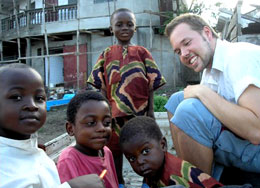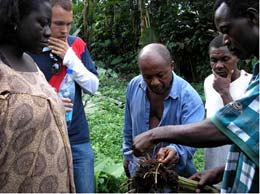United Action for Children (Buea, Fakoship Division, Cameroon)

Travis Allan with kids from the school run by United Action for Children |
I have been working this summer in the town of Buea, Fakoship Division, South West Province, Cameroon. I am working for an African-run NGO called United Action for Children, which is run by a local Cameroonian staff and accepts a large number of international volunteers each year. The organization's mandate is to create a caring society for children through innovative programs. It works toward this goal by running a child-centered nursery and primary school, a computer education center, a vocational training unit, various roving presentations on HIV/Sexual health and, recently, child trafficking (in association with The Future Group, Canada). Also, we are in the middle of an agricultural extension project in the village of Bwassa, which is an isolated community suffering from a number of crop diseases and the effects of lost agricultural subsidies from the government.
My role at UAC has been varied. I am working with a colleague from my undergraduate university (UBC) named Elizabeth France. We have a long history of working on large projects together, and have been putting our expertise, legal and managerial, to use for UAC. When I came I had planned to work on issues related to enrollment in school, but on the ground this became somewhat less appealing: the problem is, in most cases, one of lack of economic resources. Families either can't afford to spare their children's labour, or they can't afford the costs associated with government schooling (books, pencils, food and uniforms), or a combination of both. On top of this, even though the government is supposed to provide enough money for education, it does not - schools are vastly under-funded. This is the main reason why organization's like UAC exist, to try and provide good education to low-income families. When I realized this, I shifted my attention more toward the organization I am working for, in the hopes of making some concrete difference here. You could say that I went "in house," and by being flexible with my mandate here, I have been able to get more accomplished than I had ever expected.
Labour Relations
My legal training (such as it is) has been a huge asset for the organization. Elizabeth and I have come up with new labour policies for UAC's many local staff, a project that was heavily influenced by my first year studies at U of T law. We took a totally disorganized, outdated, and patchy collection of job descriptions and created an organized and realistic collection of descriptions that can serve as basic employment contracts, allowing management to clarify their expectations of a growing number of staff and to insist on adequate job performance. As a corollary to the actual descriptions Elizabeth and I also created a formal disciplinary process that is included in each employee's job description. We looked at Canadian best practices in this area, local law, and then simplified the result so that it would create a workable, fair, and transparent system. Right now we are in the process of getting the descriptions signed and helping management implement them.
Loss and Theft Prevention
Another area where my legal training has been very helpful was in our advice to management on the very touchy issue of loss and theft prevention. We have proposed an inventory process, and combined it with the earlier work on disciplinary practices in order to make a comprehensive strategy. It was an interesting challenge because we had to balance what was theoretically "best" with what would be effective in real life. I am not sure if we have reached the ideal balance because the first inventory won't take place until we have left, but at least we have started them in the right direction.
Use of Donations
a) Cash
One of the biggest challenges we have had is trying to make sure that donations given to UAC are used for the purposes they were originally given. This has been a huge challenge because of the undeveloped state of bookkeeping in Cameroon. Since I didn't know much about this subject I had to teach myself a lot about bookkeeping, but this was probably a good thing. Since the organization works on cash only, there is really no way to ensure that the organization follows North American accounting norms; without cheques and monthly bank statements a lot of the safeguards that are in place in North American not-for-profits and NGOs just don't have any effect. What this means is that we have had to be creative about safeguarding money, not because we don't trust the employees here, but because we have to think about the organization's future as well as its operations in the present. We are leaving a concise memo on book-keeping and budgeting that will hopefully address some of the problems through the use of better oversight, rules relating to cash disbursements, and annual reports.
b) In-Kind
Another large issue for us has been the use of in-kind donations, which sometimes end up being used in ways totally inconsistent with their intended uses. We observed early on that, rather than deliberate misconduct, most of these situations come from a poor understanding about the rules and regulations that should be at the center of any NGO. In comparison to some of the other organizations here the problems were hardly note-worthy, but they were definitely causing some morale issues for other international volunteers who failed to understand that there were some serious differences in cultural norms at work.
In approaching this problem Elizabeth and I first considered what our major objectives were, which were to make sure that in-kind donations were used according to their donor's wishes, and that this stayed the case even after we left. Considering these objectives we knew that a direct confrontation was not going to work; in fact, it had been tried before with no success. What we did instead was get a hold of the original grant applications and documentation for the items in question, taking them as a binding set of rules and guidelines for the equipment's use. From there we designed a set of guidelines that covered the key rules and had them approved by management. We tried to base our recommendations on the organization's own self interest: better long-term relations with donors being a primary motivating factor. This might not be traditional lawyering, but I think that it was the best way to get the objective we were looking for, and it leaves a paper trail signed by management that future volunteers can use to push these reforms.
Agricultural Extension

Travis Allan in the field with Bwassa farmers and the divisional head of agricultural extension |
This internship has really given me a great insight into development. One of the most important experiences has been organizing a long-term agriculture project in the village of Bwassa. I definitely did not come here to farm cocoyams and plantains but there was a project that was going to flounder if Elizabeth and I didn't take it over. It turned out to be one of the most trying experiences of my life. We had seemingly endless meetings with the village group, trying to understand what the crop problems were (through a pidgin translator who would often forget to translate for us, or would add his own erroneous thoughts when translating what we said). We then took the problems to a government agricultural department, convinced the head minister for the province (known here as the "Provincial Delegate") to support us with a team, and then arranged for a project to address the crop problems. Unfortunately, the team didn't tell us until after we set everything up with the farmers that they expected "motivation" (aka bribes) to complete the work. Bearing in mind that they were asking us to pay them to do agricultural extension work (their jobs) inside their own area of responsibility (Fako Subdivision) this was a frustrating development indeed. Luckily, the head of UAC was able to find alternative arrangements and the project is taking off, but it has been incredibly draining, especially considering that the people we are helping are living on the most tenuous subsistence basis, and aren't even completely convinced of the methods advocated by the government workers. Getting into the field for this project has been the biggest learning experience for me in terms of real-world development. It has been especially important for me to see the way that the villagers have changed their opinions toward us. They were initially highly skeptical of any development work short of money because they had been disappointed by so many other development groups in the past.
We have set up monthly visits from the agricultural extension officer over the next six months, written information pamphlets for the farmers, and are currently writing up a project handbook so that future volunteers can repeat the work at other villages. Now that this project is completed UAC will be conducting intensive sensitization sessions on HIV/AIDS and other pressing health issues in Bwassa, as well as leading a Peacework Development project there to build more sanitary toilet and dish drying facilities.
Human Trafficking
Another really great project that I have had a chance to be involved with is the human trafficking project set up by The Future Group, Canada, which is working throughout Cameroon to raise awareness (called "sensitization" here) about children who are sent from small villages to live with relatives or "friends" in bigger towns and cities, and who are forced to work under exploitative conditions with no free time and sometimes no education. Elizabeth and I have been working to make sure that the sensitization sessions continue now that the coordinator has returned to England, attending presentations and giving feedback to the local worker, as well as providing advice on fundraising to sustain the project.
Law & Development
I have really enjoyed my work here because it has allowed me to use my legal and my development training. A lot of my projects here have involved finding practical solutions to really complex behavioral and managerial problems, problems which don't really fit into neat categories like "law" or "economics." The biggest question I have now is whether our work is going to survive our departure, and only minimal oversight by future volunteers to the organization. We have spent a lot of time explaining the rational for the rules and procedures we have been proposing, making sure that the things we do don't just die out as soon as we get on the airplane. If even fifty percent of what we have implemented is adopted I think that will be a big step toward improvement. The organization's management is very happy with the proposals we have submitted, and we will continue our relationship after this internship is over, so I think there is a good chance that some of these changes are going to be long term.


